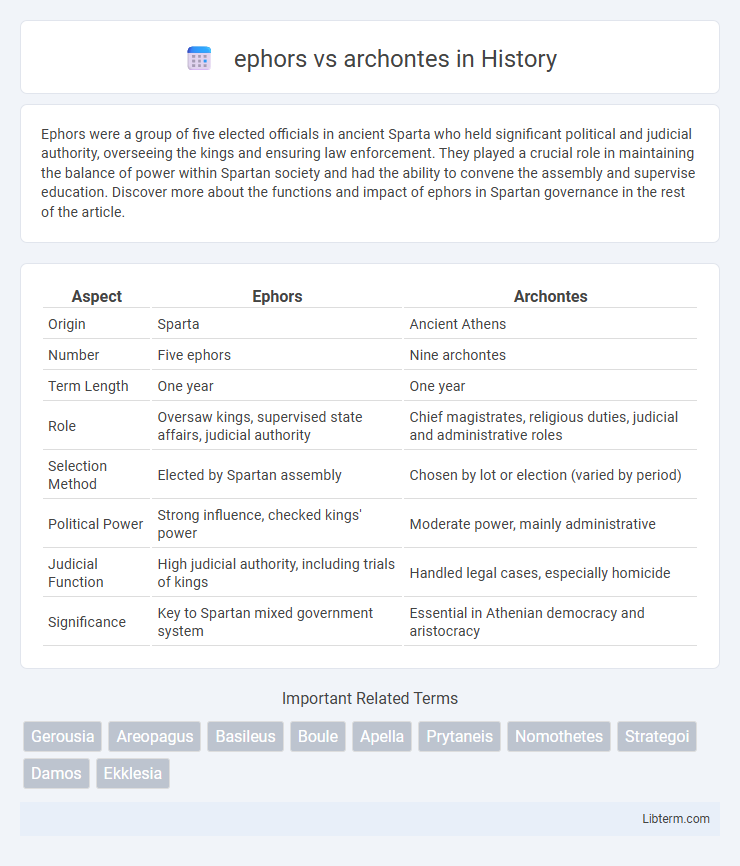Ephors were a group of five elected officials in ancient Sparta who held significant political and judicial authority, overseeing the kings and ensuring law enforcement. They played a crucial role in maintaining the balance of power within Spartan society and had the ability to convene the assembly and supervise education. Discover more about the functions and impact of ephors in Spartan governance in the rest of the article.
Table of Comparison
| Aspect | Ephors | Archontes |
|---|---|---|
| Origin | Sparta | Ancient Athens |
| Number | Five ephors | Nine archontes |
| Term Length | One year | One year |
| Role | Oversaw kings, supervised state affairs, judicial authority | Chief magistrates, religious duties, judicial and administrative roles |
| Selection Method | Elected by Spartan assembly | Chosen by lot or election (varied by period) |
| Political Power | Strong influence, checked kings' power | Moderate power, mainly administrative |
| Judicial Function | High judicial authority, including trials of kings | Handled legal cases, especially homicide |
| Significance | Key to Spartan mixed government system | Essential in Athenian democracy and aristocracy |
Introduction to Ephors and Archontes
Ephors were a group of five magistrates in ancient Sparta responsible for overseeing the kings' actions and maintaining state laws, serving as a check on royal power. Archontes, primarily found in ancient Athens, were nine chief magistrates who administered civil and religious duties, with the Archon Eponymous holding the primary leadership role. Both institutions played crucial roles in their respective city-states' political systems, balancing authority and governance.
Origins and Historical Background
Ephors originated in ancient Sparta around the 8th century BCE as a group of five officials elected annually to oversee the kings and maintain internal order. Archontes, on the other hand, were magistrates in ancient Athens dating back to the early 7th century BCE, responsible for judicial and religious duties during the city's early aristocratic period. Both offices reflect distinct political systems: Sparta's oligarchic governance structure contrasted with Athens' evolving democracy.
Structure and Composition
Ephors were a group of five annually elected magistrates in Sparta who held significant executive and judicial powers, overseeing the king and ensuring adherence to laws. Archontes in ancient Athens consisted of nine officials, including the Archon Eponymous and Archon Basileus, responsible for religious, judicial, and administrative duties, serving primarily one-year terms. The ephorate functioned as a collective supervisory body, whereas archontes operated as individual officials with distinct roles within the Athenian government structure.
Roles and Responsibilities
Ephors held significant judicial and administrative powers in ancient Sparta, overseeing legal matters, supervising kings, and ensuring adherence to laws. Archontes in Athens primarily functioned as chief magistrates responsible for legal, religious, and civil duties, including presiding over courts and organizing state ceremonies. While ephors acted as a collective governing body with authority over both kings and citizens, archontes served individual roles with specific, often limited, administrative responsibilities within Athenian democracy.
Selection and Appointment Processes
Ephors were selected annually by the Spartan assembly through a voting process, emphasizing accountability and rotation among eligible citizens. In contrast, Archontes in ancient Athens were primarily chosen by lot from a pool of qualified aristocrats, ensuring a form of random selection to prevent concentration of power. The ephorate system promoted direct political oversight, while the archonship balanced democratic principles with aristocratic traditions.
Powers and Limitations
Ephors held significant executive and judicial powers in ancient Sparta, overseeing kings and enforcing laws, but their authority was checked by annual elections and collective decision-making to prevent tyranny. Archontes in Athens primarily served as magistrates with limited administrative and religious duties, lacking the broad political control characteristic of ephors. The ephors' power to summon and preside over the assembly contrasted with the more constrained and ceremonial role of archontes, highlighting a clear distinction in governance and authority between these offices.
Influence on Political Systems
Ephors in ancient Sparta held significant political power, overseeing kings and ensuring the enforcement of laws, which contributed to a mixed oligarchic-monarchical system. Archontes in Athens functioned primarily as magistrates with limited terms and judicial responsibilities, influencing the early development of Athenian democracy. The ephorate's authority curtailed royal power while the archontes' roles evolved towards democratic governance, reflecting their respective city-states' political structures.
Key Differences Between Ephors and Archontes
Ephors were a group of five elected officials in Sparta responsible for overseeing the kings and maintaining civil order, while Archontes were nine magistrates in Athens who handled judicial and executive functions. Ephors held significant power, including the ability to indict kings and enforce laws, contrasting with Archontes whose roles were more limited to administrative and religious duties. The Ephorate functioned as a collective check on Spartan monarchy, whereas the Athenian Archontes primarily served during the early stages of Athenian democracy.
Legacy and Historical Impact
Ephors in ancient Sparta wielded significant political power, overseeing the kings and maintaining state law, leaving a lasting legacy as a unique check on monarchic authority in Greek history. Archontes in Athens held executive and judicial roles, shaping early democratic governance structures that influenced subsequent political systems in the Western world. The contrasting roles of ephors and archontes highlight differing approaches to leadership and governance in classical antiquity, with enduring impacts on political theory and institutional development.
Ephors vs Archontes: Comparative Analysis
Ephors and Archontes were key political offices in ancient Sparta, with Ephors holding executive power and overseeing legal matters, while Archontes functioned primarily as magistrates with religious and judicial duties. Ephors were elected annually and had authority to check the king's power, enabling a form of accountability, whereas Archontes operated mainly in Athens, maintaining civic order and presiding over public assemblies. The Ephorate's influence extended to military, education, and governance, contrasting with the Archontes' more administrative and ceremonial responsibilities.
ephors Infographic

 libterm.com
libterm.com